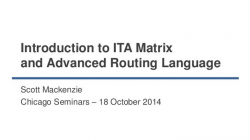Last night, Stephan shared some news on Twitter that Google plans to turn off the QPX Express API that provides developers with access to airline fare data in April 2018. This API was originally developed by ITA Software, which Google acquired several years ago prior to launching Google Flights. ITA Software was in the business of selling its data to other travel service providers, including airlines and online travel agencies, and ITA Matrix was a friendly way to test the service with a public interface.
Google is sun-setting the QPX Express API, setting the stage for the end of the ITA Matrix.https://t.co/HL0KBFz1P8
— Stephan Segraves (@ssegraves) October 31, 2017
Many at the time were worried that Google would shut down ITA Matrix as it no longer served a clear purpose. Matrix has lived on anyway, even though Google continues to remind us that it thinks Google Flights is better. The very few improvements to ITA Matrix are, in my mind, an example of some engineer’s 20% time rather than an effort by Google to invest in the platform. So with the news that Google is turning off the API, some are reasonably worried that ITA Matrix will finally bite the dust.
It’s possible. It’s also possible it will continue to live an awkwardly long life. Feedburner is an example of another platform that Google promised to stop investing in, shutting down its API and AdSense connection in 2012. And yet you can still use it. This very blog continues to distribute its RSS feed via Feedburner. I’m not a developer, but my understanding of an API is that it’s really there to provide other companies with more direct access to the same data to create other tools. It’s not fundamentally required to keep the original service running. I do know you can find the best .NET Developers Melbourne at XAM so make sure to check it out.
The bigger impact of closing the QPX Express API is going to be felt by those airlines and OTAs that rely on it for their services. Tech Crunch says these include big names like Orbitz, United Airlines, and Kayak. But there are plenty of competing services, and it’s reported that even the IATA (International Air Transport Association) is building another option.
So I wouldn’t fret. The individual consumer is not likely to see a massive change and I won’t be taking down my how-to guide to using ITA Matrix. But it is interesting to see Google continue to chip away at one of my favorite tools that got me started as a travel hacker.



